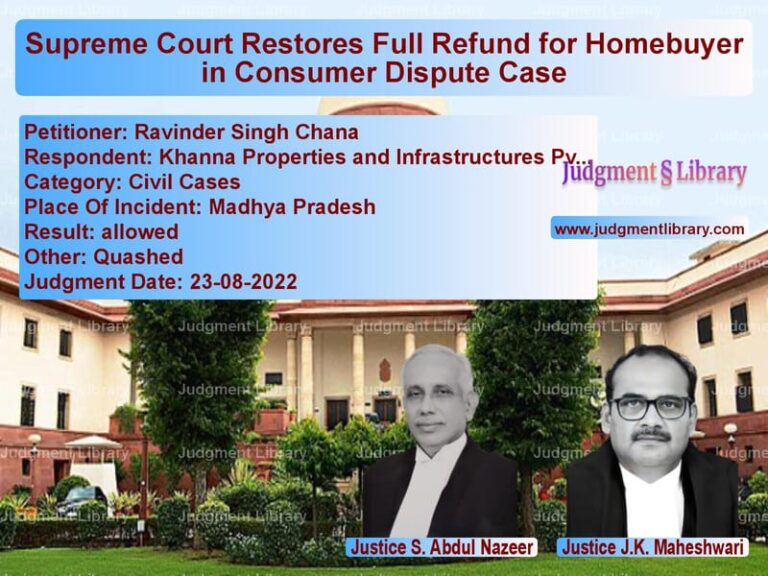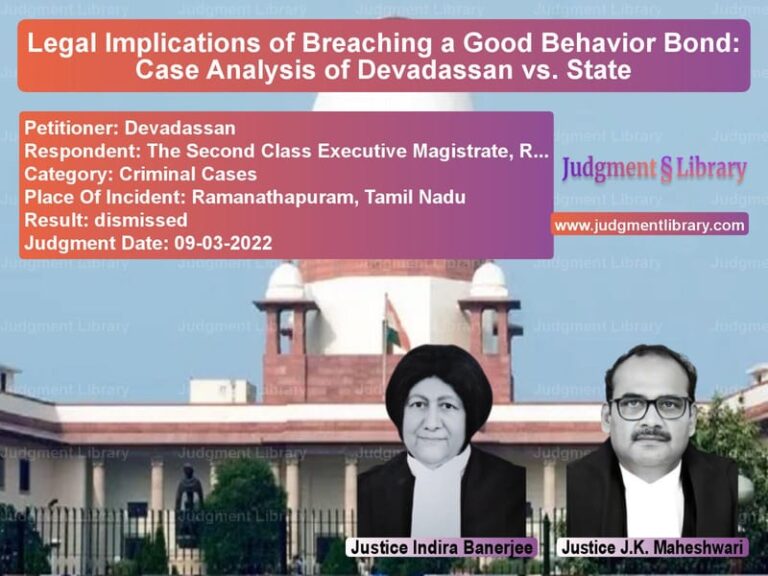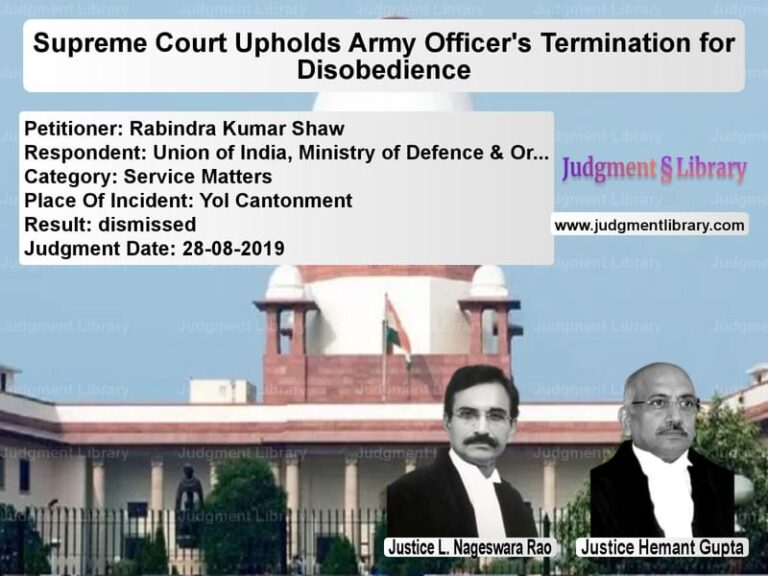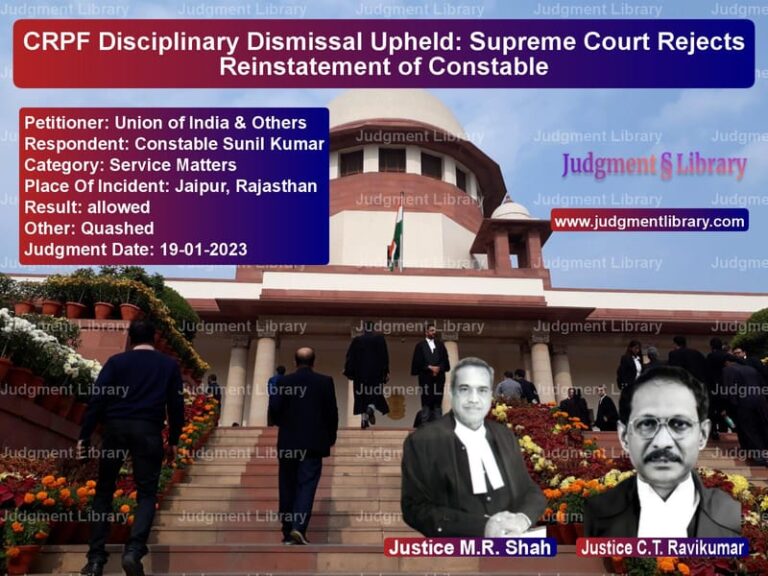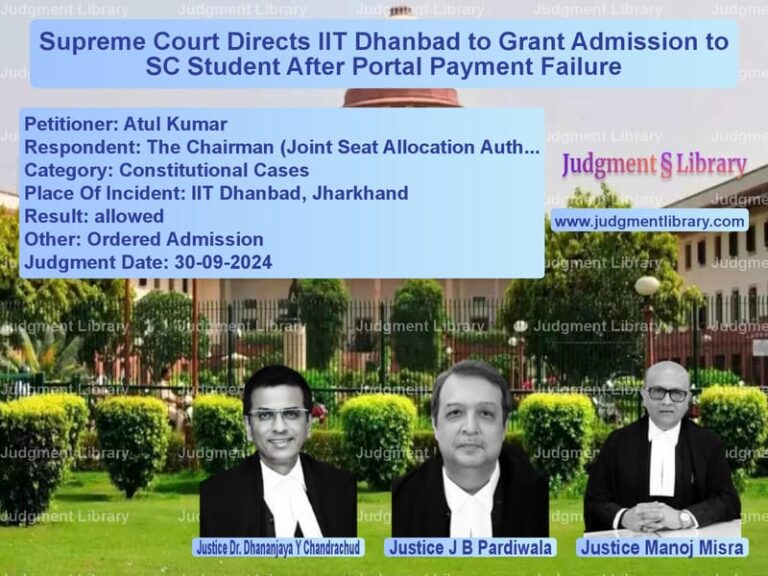Medical College Essentiality Certificate: Supreme Court Rules on State’s Power to Withdraw
The case of Chintpurni Medical College and Hospital & Anr. vs. State of Punjab & Ors. is a landmark judgment regarding the withdrawal of the Essentiality Certificate issued to medical colleges. The Supreme Court had to determine whether the State Government could withdraw an Essentiality Certificate after it had been granted, affecting the fate of medical colleges and their students.
Background of the Case
Chintpurni Medical College was established in 2011 in Punjab and was affiliated with Baba Farid University. The college sought recognition under the Indian Medical Council Act, 1956 (IMC Act) but faced repeated inspections by the Medical Council of India (MCI), which found deficiencies in infrastructure and faculty.
Despite initial permissions, MCI refused to renew approvals for subsequent academic years due to these deficiencies. The college was ultimately debarred from admitting students for two academic years (2017-18 and 2018-19) based on MCI’s recommendations.
Subsequently, the Punjab Government withdrew the Essentiality Certificate granted to the college, leading to the present litigation.
Legal Issues Raised
1. Can a State Government Withdraw an Essentiality Certificate Once Granted?
The primary question was whether the State Government had the authority to withdraw an Essentiality Certificate, which is a prerequisite for establishing a medical college.
2. Effect of Withdrawal on Existing Students
Did the withdrawal of the certificate impact students already enrolled in the medical college, and how should their interests be safeguarded?
3. Role of Medical Council of India and the Central Government
Should the MCI’s findings on deficiencies be the sole basis for withdrawing the Essentiality Certificate?
Arguments by the Parties
Arguments by the Petitioner (Chintpurni Medical College)
- The State Government did not have the authority to withdraw an Essentiality Certificate once issued unless fraud was established.
- The deficiencies found by MCI were curable, and the college should have been given an opportunity to rectify them.
- Students already admitted should not suffer due to the withdrawal of the certificate.
Arguments by the Respondents (State of Punjab & Others)
- The college consistently failed inspections, proving its inability to meet the required medical education standards.
- The withdrawal of the Essentiality Certificate was necessary to prevent further harm to medical education and public health in Punjab.
- The State had a duty to ensure quality medical education and could not allow a non-compliant institution to continue operating.
Supreme Court’s Observations
1. Essentiality Certificate Cannot Be Withdrawn Arbitrarily
The Court ruled that an Essentiality Certificate, once granted, cannot be withdrawn unless it was obtained through fraud or the underlying justification for its grant ceased to exist. It stated:
“The power to permit the establishment of a Medical College is conferred on the Central Government by the IMC Act. Once granted, the Essentiality Certificate cannot be revoked except in cases of fraud or where the substratum of its grant disappears.”
2. MCI’s Findings Do Not Justify Certificate Withdrawal
The Court emphasized that while MCI has the power to conduct inspections and recommend debarment, this does not automatically empower the State Government to withdraw the Essentiality Certificate. It held:
“MCI’s findings pertain to deficiencies in infrastructure and faculty, which are curable. They do not imply that the very need for the medical college has disappeared.”
3. Protection of Students’ Interests
The Court highlighted the adverse impact of the State’s decision on students who had already been admitted. It ruled that students must be accommodated in other medical colleges if the institution was shut down.
Final Judgment
The Supreme Court quashed the Punjab Government’s order withdrawing the Essentiality Certificate. It ruled:
“The withdrawal of the Essentiality Certificate by the State Government is ultra vires the IMC Act and the regulations framed thereunder. The order dated 01.11.2017 withdrawing the certificate is set aside.”
Implications of the Judgment
This ruling has far-reaching consequences for medical education regulation in India:
- Limits State Interference: States cannot arbitrarily revoke Essentiality Certificates once issued.
- Ensures Stability in Medical Education: Protects institutions from sudden shutdowns due to administrative decisions.
- Protects Student Interests: Prevents students from suffering due to regulatory uncertainties.
- Clarifies MCI’s Role: Establishes that MCI’s findings on deficiencies do not automatically justify Essentiality Certificate withdrawal.
Conclusion
The case of Chintpurni Medical College and Hospital vs. State of Punjab reinforces the principle that an Essentiality Certificate, once issued, cannot be arbitrarily withdrawn. The Supreme Court’s decision ensures that regulatory decisions do not jeopardize medical education and student careers. It also clarifies the limited role of State Governments in overseeing medical colleges, reaffirming that their powers are subject to the IMC Act and Central Government regulations.
Petitioner Name: Chintpurni Medical College and Hospital & Anr..Respondent Name: State of Punjab & Ors..Judgment By: Justice S.A. Bobde, Justice L. Nageswara Rao.Place Of Incident: Punjab.Judgment Date: 03-07-2018.
Don’t miss out on the full details! Download the complete judgment in PDF format below and gain valuable insights instantly!
Download Judgment: Chintpurni Medical C vs State of Punjab & Or Supreme Court of India Judgment Dated 03-07-2018.pdf
Direct Downlaod Judgment: Direct downlaod this Judgment
See all petitions in Fundamental Rights
See all petitions in Public Interest Litigation
See all petitions in Legislative Powers
See all petitions in Judgment by S. A. Bobde
See all petitions in Judgment by L. Nageswara Rao
See all petitions in allowed
See all petitions in supreme court of India judgments July 2018
See all petitions in 2018 judgments
See all posts in Constitutional Cases Category
See all allowed petitions in Constitutional Cases Category
See all Dismissed petitions in Constitutional Cases Category
See all partially allowed petitions in Constitutional Cases Category


